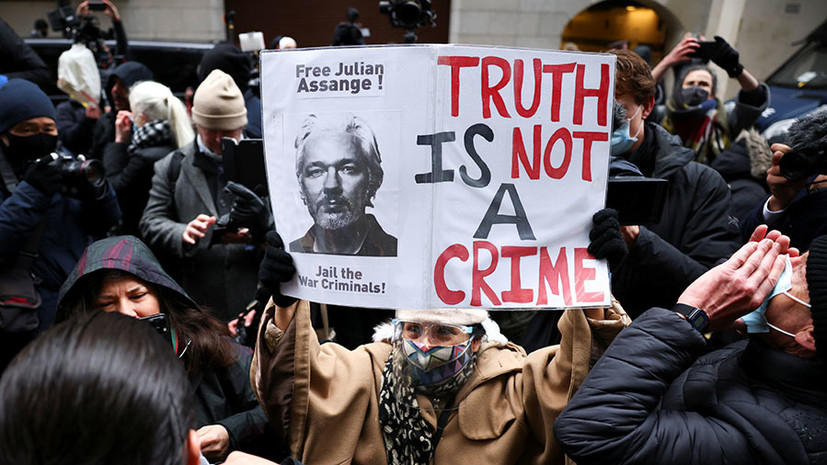A London court refused to extradite WikiLeaks founder Julian Assange to the US authorities.
The reason for this was fears for the mental health of the accused.
Westminster Magistrates Court Judge Vanessa Baraitser noted that Assange suffers from clinical depression and autism spectrum disorders, and is also at risk of suicide.
“Given Mr. Assange's mental health, I have come to the conclusion that extradition to the United States of America could worsen his condition,” Baraitser said.
"The last substantive defense argument is related to Assange's health, and I spent some time studying the state of health and the conclusions of psychiatrists ... I took into account that special administrative measures may be applied to him in the United States, implying serious isolation," the judge quotes RIA Novosti ...
Baraitser added that Assange possesses sufficient intellectual ability to circumvent measures aimed at preventing his probable suicide attempts, in connection with which his extradition to the United States is impossible.
Representatives of the American side intend to appeal the court decision.
In turn, Assange's defense announced plans to demand his release on bail - this issue will be considered on Wednesday, January 6.
Until this day, the founder of WikiLeaks remains in custody.
In addition, Assange's lawyers believe that today's verdict is only the completion of the initial stage of the process.
Lawyers believe that the case could drag on for many years and in the future the proceedings are likely to reach the British Supreme Court or the European Court of Human Rights.
Commenting on the decision of the London court, international lawyer, honorary lawyer of Russia Valery Vanin noted that the main reason for refusing extradition should have been the prospect of severe punishment of the journalist in the United States.
“The refusal to extradite Assange precisely because of his poor health condition is undoubtedly a blessing for Assange.
But the main reason for the refusal should have been not Assange's poor health, but the fact that in the United States he could be punished up to the death penalty.
And the extradition of people to such a jurisdiction where the death penalty is possible is prohibited by UK law, ”said the interlocutor of RT.
According to the lawyer, Assange's state of health can be challenged by lawyers of the US authorities and "can be interpreted differently."
In turn, Grigory Yarygin, Associate Professor of the Department of American Studies at St. Petersburg State University, expressed the opinion that Assange's team will have a long struggle, since his opponents do not intend to give up their goals.
The political scientist added that the issue of the journalist's extradition is under the jurisdiction of the US special services, and not a specific administration.
"The defense of Julian Assange needs to use the window of opportunity in order to at least keep Assange in the jurisdiction of the UK, but I think that if the issue is only in legal aspects, the United States will continue its business and under the next administration will still insist on extradition," Yarygin noted.
Prosecution and arrest
Recall that Julian Assange gained fame after the foundation in 2006 of the WikiLeaks portal, which published classified documents.
The prosecution of the activist began in 2010 against the backdrop of the portal's publication of information about the war crimes of the US army in Afghanistan and the Middle East.
In particular, the shooting of civilians by a US military helicopter in Baghdad in 2007, during which Reuters journalists were killed, was mentioned, as well as reports of numerous casualties among Iraqi civilians as a result of negligent actions of the US Air Force were published.
Assange received this information from US Army intelligence analyst Bradley Manning, who was later sentenced to 35 years in prison.
In 2017, he was released after his sentence was reduced.
When the persecution of Assange began in 2010, he was in Sweden awaiting a work permit.
The activist fled the Scandinavian country after being charged with sexual harassment.
The journalist stressed that he was being persecuted for political reasons and fled to the UK.
In 2012, out of fears that the British authorities would extradite him to Sweden, after which he could be extradited to the United States, Assange took refuge in the Ecuadorian embassy in London and asked for political asylum.
He spent the next seven years in the diplomatic mission building.
Despite this, WikiLeaks continued to publish classified materials from the American intelligence services.
In April 2019, Ecuadorian President Lenin Moreno announced that he would refuse Assange political asylum and revoke his previously issued Ecuadorian citizenship.
The British police were allowed into the territory of the diplomatic mission, who arrested the founder of WikiLeaks for failing to appear in court in 2012 at a hearing on charges brought against the Swedish prosecutor's office.
In May 2019, a London court sentenced Assange to 50 weeks in prison for violating bail conditions.
In the course of subsequent events, the American Department of Justice brought 18 new charges against Assange, in the aggregate of which Assange could face up to 175 years in prison.
The Russian Foreign Ministry called the case against Assange a "total disgrace." As noted by the official representative of the department, Maria Zakharova, the entire world community qualified this process as a blow to the institution of investigative journalism, free and independent media, as well as basic human rights.

